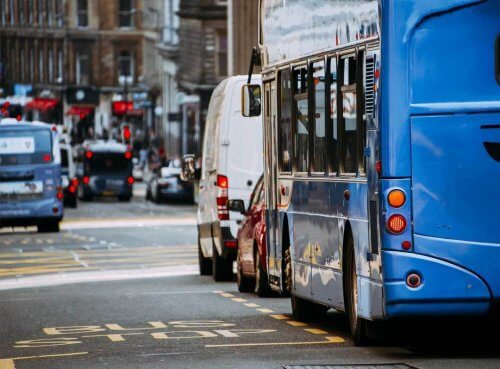The Scottish Government is providing £10 million to support the rapid deployment of bus priority infrastructure by local authorities. In addition, the £8.8 million Bus Emissions Abatement Retrofit scheme now has improved grant thresholds for operators.

Working in partnership with bus operators, the new infrastructure fund will help areas of Scotland with the highest concentration of congestion to implement temporary measures, including bus lanes or gates, which are intended to make bus journeys quicker and more reliable for passengers.
Following a statement on Transport to the Scottish Parliament, Cabinet Secretary for Transport, Infrastructure and Connectivity Michael Matheson said: “I’m pleased we can offer a new £10 million package of support to local authorities in order to reduce the impact of congestion on our busiest bus routes. At the same time we have improved the grant thresholds to encourage applications to our exhaust retrofit scheme in order to help operators meet our air quality objectives.
“The bus sector is responding to not only increased operating costs during COVID-19, but also increasing congestion as restrictions are eased which will negatively impact on bus journey times. I hope these steps will be welcomed in conjunction with the action we have already taken to maintain the value of Bus Service Operator Grants and concessionary travel payments at pre-crisis levels. This is in addition to the £46.7 million emergency funding package we’re providing to ramp up services as the lockdown eases and demand picks up.
“By providing this support for bus priority infrastructure, we’re directly helping bus passengers who we know typically have fewer alternative travel options – helping to improve journey times on congested routes.
“With capacity on buses reduced due to physical distancing, it’s important we leave space for those that need it most. While this step will make bus journey times faster on pinch points, I would continue to ask people to work from home and stay local if they can. Walk, wheel or cycle where possible and plan ahead if using public transport to help manage demand. Let’s continue thinking about how and when we travel so that we can keep Scotland moving.”
Paul White, Director for CPT in Scotland said: “Bus is a key element of the sustainable and active travel hierarchy, providing three quarters of all public transport trips. As such, CPT welcomes this investment to tackle congestion and to further improve the emissions profile of the Scottish bus fleet. This work will assist in the provision of a reliable, green alternative to car use as people increasingly look to travel.
“COVID-19 travel restrictions demonstrated the potential journey time and reliability improvements possible if bus is freed from car traffic. It is critical we lock in these benefits and the resultant improvements in air quality.”
Sam Ibbott, Head of Smart Cities at the Environmental Industries Commission said: “This is very welcome news for air quality in Scotland. The funding will enable specialised equipment to be fitted to clean up buses – improving the quality of urban life while also supporting skilled engineering jobs. Buses form a central part of our public transport system and given the terrible health impacts from dirty air we must make sure they are part of the solution, not part of the problem.”


